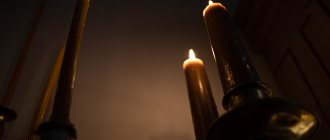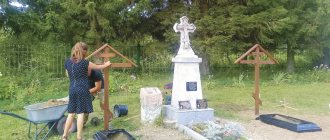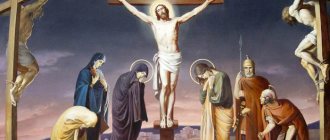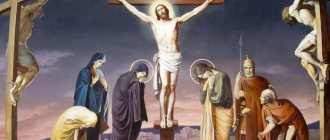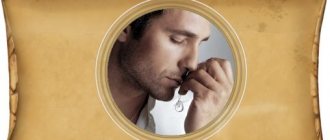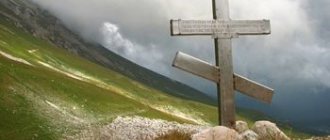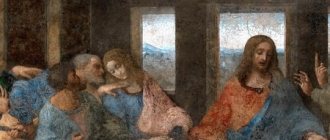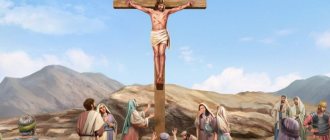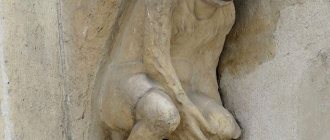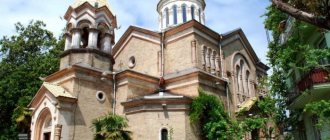Orthodox Life
Website of the convent in honor of the icon
Mother of God "Consolation and Consolation"
Readers are offered a narrative about the Athos period of life (1980-2018) of the ever-memorable abbot of the Dokhiar monastery, Archimandrite Gregory (Zumis).
This touching and sublime text was written shortly after the blessed death of Geronda by the brethren of the Dochiar monastery and in the fall of 2019 it was published in the publication of the Gregoriate monastery, also translated by the Dochiarit at the request of the sisters of the Olshansky monastery who deeply reverence Elder Gregory, and they prepared for the first publication in Russian, dedicated to feast day of St. Gregory of Nyssa, his heavenly patron.
From the brethren of the Holy Monastery of Dohiar
The year ends from the venerable death of our blessed elder. A whole year is one of those few that fill our earthly life, but we just cannot realize that Geronda has irrevocably gone to his forefathers. It’s as if he’s gone somewhere for a while and we’re waiting in sweet anticipation for him to return. Therefore, we do everything in the monastery as if he should soon return and check on us with the usual quiet joyful sadness written on his tired face.
It is difficult to embrace such a spiritual figure as Geronda Gregory, and to try to make clear his hidden spiritual life, to put on paper his spiritual and physical works on the restoration of the monastery, the maintenance of the brethren and on personal sanctification. And if we add to this the fact that the person being described had a rule of living hidden and sometimes consciously acting like a fool for the sake of Christ, then everything becomes even more difficult, and only obedience and a sense of duty can help make this task feasible.
So, we will try to describe “as through a dark glass” the life of Geronda on the Holy Mountain, where he lived as abbot of the monastery for half of his earthly life, that is, for thirty-eight years.
To describe the spiritual origin of Geronda, as an epigraph we will cite here the words of the Venerable Nile of Sinai in a small adaptation: “As not a false, but a wonderful and very commendable branch of the illustrious and most valiant Abba Amphilochius of Patmos, you rightly reveal in yourself the radiant features of this man...”
From the 1970s to the early 80s, a true cosmogony took place on the Holy Mountain, the results of which will be judged by history when “that whole generation...” passes away. In the large royal monasteries, when they had already reached despair from the lack of husbands, new brotherhoods began to settle, originating from monasteries outside the Mountain or from the farmsteads of the Svyatogorsk monasteries. Where the Holy Mountain was fading away, its youth suddenly began to be renewed “like an eagle.”
A fresh spring succeeded a dry winter. These events were a little reminiscent of the era of St. Athanasius of Athos, when, coming from Kimina, he brought to the hitherto deserted Athos a cenobitic and Lavra system, a church typicon, similar to the one adopted in the Studian monastery.
New brotherhoods in the idiorhythmic monasteries in which they settled, in addition to transferring them to dormitories, introduced the concept of “geronda” - abbot-spiritual, elder - which the old man of Athos needed to revive him in this era. Otherwise, the deep spiritual traditions of the Holy Mountain transformed the new monks, and the settlement was crowned with success, since everything that happened could not but be in God's plan and under the maternal care of the Mother of God.
At this time, in the late 1970s, the brotherhood of the monastery of Prusiotissa, under the leadership of Geronda Gregory, desired to move to Holy Athos, the common homeland and country of monks. We will neglect many little things so as not to lengthen the story, also because many individuals are now alive, and only after time will history allow us to look at these people impartially.
Geronda did not prefer the Vatopedi monastery for settlement, which officially invited us through Progumen Matthew. He did not turn his gaze either to Iviron, to which the Patriarchal Exarchate sent us, or to Xiropotamus, to which Abbot Eusebius not only invited us, but also begged us to come. His soul found peace in the poor but beautiful monastery of Dochiar, in the monastery of the Archangels and the Quick to Hear. In addition, this path was shown to him by Elder Ephraim of Katunak, who deeply revered the Quick to Hear: “All saints,” he said, “worship the Mother of God.”
The situation at the monastery was difficult. The old fathers, of whom there were few left, wanted to transfer the monastery to the zealots. The Holy Kinot and the Exarchia recommended a brotherhood from another populous monastery. In this chaos, we from the Pruso monastery were looking for settlement in Dohiar. Still, apparently, the Archangels made their choice.
We will not give here details that are unimportant today. After a series of events, a sufficient number of monks from the Geronda brotherhood remained in the monastery in May 1980. However, there was obvious uncertainty about the future.
During these days, one monk, as he said, had the following frank dream-vision: he found himself behind the impregnable tower of the monastery next to the monastery cypresses.
There, at a short distance, he saw Archangel Michael, a huge man holding a small image of the monastery on his shoulders, and, turning to the monk, said: “I am walking, looking for a husband suitable to transfer the management of this monastery onto his shoulders.” He did not have to wait long to find him in the person of Geronda Gregory, who literally until his last breath held the monastery on his shoulders and did not betray the trust of the Archangel.
On September 15, 1980, Geronda was enthroned as the first abbot and cenoviarch after centuries of the idiorhythmic life of Dohiar. The entire Holy Kinot and some abbots were present.
However, the monastery was in a sad state. Everything that I will describe soon should not be considered an exaggeration. These are real events, although they belong to bygone eras.
The monastery, as we have already said, followed the idiorhythmic system, so there was no kitchen, no dishes, no plates with spoons and forks. Archondarik received us for the first time. The income of the monastery came from the insignificant economic support of the state, that is, the assistance that the state gives in return for the monastic land outside Athos, confiscated by the Greek authorities.
A small old car, which was purchased after the sale of two metokhs (farms), probably added more problems than income. The forest, depleted by the gluttony of traders, brought minimal income without a road. The cells of the monastery were in desperate condition. When old fathers died, after them they took away what could still be useful, and the cells, in which everything left behind (clothing, furniture, etc.) was scattered, resembled a den of robbers. The roofs were leaking. The glass was broken. The doors were broken (Kinot's delegation, in their zeal to discover and expel the Zealots, broke all the doors!).
The warehouse of the monastery in Daphne was occupied by the ever-memorable Svukis for his shop. There the fathers took some food to survive.
We especially remember how one day we wanted to cook rice with zucchini. We asked the former abbot of the monastery Xenophon, Father Evdokim, who was then a cellarer in Dohiara, for some rice. He gave us one small bag - all that was available - its age could only be determined by carbon dating. Its contents were literally ground up by mice and mixed with their excrement. And how will the unfortunate cook sort it out and clean it?! No matter how hard he tried, nothing worked for him. In the end, with heartache, after washing it, he cooked the rice as it was, adding more mint and pepper so that the composition of this mixture would not be so obvious.
All this and much more was reflected in Geronda. But he did not lose heart in the face of these difficulties, which then seemed insurmountable. He had to lead all matters: suggest a suitable solution to every problem and difficulty, not supervising, but first working himself with his small but inexhaustible forces. We repaired the crumbling plaster from the walls of the cells and partitions with lime and straw without a trowel, using our palms, and after that we whitewashed them so that the cells became suitable for habitation. They saved themselves from leaking roofs by using tin cans in the attics. Overgrown yards were cleared by cutting off tall grass with hoes.
We cleared the overgrown olive trees, cutting off the bushes - scarlet and panicle - with axes and sickles, and the old Holy Mountain residents smiled peacefully and said: “Why are you clearing them, they will grow over again.” Despite this, in the very first year we extracted the first oil in the ancient oil mill of the monastery. And, of course, according to tradition, the required fried flatbreads (tiganitas) were prepared in the first oil. However, since there was no separator, the oil was bitter and difficult to swallow. At this time, we were visited by a captain from Karpenisi, whom Geronda received at the Pruso monastery. When he saw the state of the monastery and the monks, he ran away, crying, and said to Geronda: “You were a rich man, but you became a beggar.”
This is how Geronda’s first years passed in the monastery - in hardships, sorrows, bitterness and in the labors of his own hands. His royal scepter was a broom made of heather branches, and his “four-harnessed chariot” was a scoop. He did not let go of the hose, watering numerous flowers. One day, the chairman of the Patriarchal Exarchate, Metropolitan Maxim of Stavrupol, the rector of the Halki school, a lover of cleanliness, arrived at the monastery and said to Geronda: “Nowhere can anyone find fault with you. I keep trying to find at least one unswept corner and I can’t find it.”
Geronda did not force any of the few fathers who already lived in the monastery to follow the communal rules. He gave them food, and they could go to their cells, as they preferred, and not attend the common meal.
When KeDAK (Athonite Heritage Preservation Center) began restoration work on Athos, Geronda slowly created a construction team from the brethren, and the projects that KeDAK organized and financed were implemented by us ourselves. So some funds remained in the monastery. Geronda was personally present at all these and other works in the monastery and outside the monastery. With a crowbar and a pick, he himself knocked down old partitions, destroyed ceilings, and rotten floors. Everyone became an eye to avoid injury to the brethren. He used a shovel to fill bags with construction waste so that it would be carried out of the monastery by “luminous men” - the smart donkeys of Christ who carry the Cross of the Lord on their shoulders - the world-denying monks. In construction and restoration work in the monastery, Geronda was conservative. He honored the old image of the monastery and did not change it: the elements that he could preserve were preserved in memory of those who had worked before him to build the monastery.
But Geronda was a special expert in something else - in stones. He sorted them: those that had a flat chip were used for cladding, others for filling, and some were suitable for paving. When he came across boulders, he tried to break them along natural cracks so that they remained suitable for construction.
In everything he was a teacher and a pioneer. With unspeakable labors, as the new Bezaleel, he “restored the fallen tabernacle” of the divine Archangels. And today, anyone who looks at the monastery close or from afar cannot help but remember the sorcerer Balaam: “How beautiful are your tents, Jacob, your dwellings, Israel!”
However, Geronda did not stop at restoration work. He tried to maintain the life of the monastery using the land. He often said to us and at meetings in Kinot: “Eastern monasticism is agricultural. It is not based on entrepreneurship, but on the cultivation of the land.” Therefore, where there was at least a little water and the soil allowed, he planted new gardens. He planted grapes, olives and fruit trees. Wherever he found soil, he planted a tree and watered it “until it rises,” as he said.
Geronda also created salt pits for the production of salt, trying to take the monastery “off the hook” of the market and make the monastery independent, self-sufficient in emergency situations.
He also planted many dates to remember the cradle of monasticism - the deserts of Egypt and Libya. But after his death, “the worm of the morning struck them,” and they withered, as if he wanted to take with him the image of Thebaid and Egyptian monasticism as already unattainable.
In the early 1990s, with the help of God, the construction of a metoha began in the village of Soho, Langada district. New ktitor's works. At first we spent the night in the open air or in tents. Geronda spent the whole day cleaning the boards with a pick, taking nails out of them and sweeping.
Since God’s work was being done—a place of exploits, prayer, and pleasing the Lord was being created—the enemy did not rest. Geronda appeared like a lion spitting fire, and, gritting his teeth, said to him: “I will arrange it for you.” Indeed, he stung Geronda in the most painful part - his fatherly gut. The heart cracked like a stone in the desert, under the blow of Moses’ rod. Streams of tears and rivers of immeasurable pain ran for those who had chickened out before the cunning malice of the soul-corrupting wolf. Geronda knew that “...The Divine Basil ascribes to the one who recklessly separated and rejected his father a fall equal to the one who violated the very holy vow...” And he knew that this was the lot of spiritual fathers - to repeat constantly: “I raised and elevated my sons, but they were indignant against me". May the gracious and merciful God have mercy on us all, and may His wise providence take care of the salvation of us all.
Geronda was an adherent of the monastic life. He considered “all repose of the flesh an abomination to the Lord.” Therefore, he himself was not lazy and did not leave his monks without control, so that they would not spend a carefree life, like cicadas in summer. On sleepless nights he wondered what they would do in the coming day, since idleness is the teacher of all evil. He did not like comfort and indulgences. He preferred holy work, which is a prerequisite for the Kingdom of God. Geronda demanded that the monks be conscientious in fulfilling their personal cell prayer rules. “The minimum that a monk can do,” he said, “is to pray during the service and fulfill his rule.” When one monk told him that sometimes he did not have time to perform his cell canon, Geronda answered him: “I do not take responsibility for your rule.”
Others who had statutory “debts” were obliged to pay off before approaching the Holy Sacraments. Another, younger monk, tired of his work, asked him: “And we, Geronda, when will we get enough sleep?” “Never,” answered the adherent of the holy life.
Geronda did not like the movements of the monks, “trips,” pilgrimages, the movement of relics and icons outside the Holy Mountain, and conferences. He loved everything in the monastery, its very air, his beloved cell, his poor corner. When I had to leave for some need or for the sake of doctors, I tried to return as quickly as possible.
As for food, at meals he preferred simple and without excess cooked food. But I didn’t argue with the cooks either, since this obedience in the dormitories is difficult, and it is rarely preferred. Sometimes Geronda cooked himself, and his food had a special taste and special grace. Most often he cooked when we were working in our cells in the mountains, he cooked simple food in old wood-burning stoves, and this food became unforgettable for everyone who tried it, because it came from a loving fatherly heart. When, walking through the kitchen, he found unwashed plates, he did not consider it shameful to wash them.
If Geronda wanted to say something important, he did not wait for the council of elders, but said it at a meal in front of everyone and even in front of pilgrims. He followed the apostolic word: “Rebuke those who sin before everyone, so that others also may have fear.” He could speak in general and did not hesitate to name specific names. Geronda took care of the brothers in their illnesses, and at their death shed tears.
On endless sleepless nights I pulled a rosary for each of my monks, for my companions and for those who left or evaded, for the laity with their problems. From the mercy he received, he had mercy on the righteous and the unjust, without reasoning. He borrowed without expecting to get it back.
It is written: “If they make you an elder, do not be arrogant, but be among others as one of them.” Indeed, he was in no way different from the other monks - neither in clothes, nor in work. Only in his meager food, and then because of illness. Together in church, at meals, in obedience. Among the obediences, the picking of olives had a special grace. Everyone took part in it except the archondarite. Indeed, obedience in the hostel creates division, perhaps even some kind of contradiction, but collecting olives brings the brethren closer together. It was the holiday of the year.
As always, Geronda is with us, always ahead. He did not allow conversations, laughter, or voices. He wanted us to work in silence, and often assigned someone to read a prayer or akathist out loud. Late in the evenings, when it was already beginning to get dark, returning along the sea, one after another we read Compline. Oh, time gone by forever!
We cannot tell without tears what happened during the last olive harvest during Geronda’s life. It was October 2022. Geronda, already seriously ill, went to the hospital. And just before leaving, he came up to the place where we were picking olives and said: “Fathers, can I also pick two handfuls of olives? So simple. For the sake of oil in the lamps of the Mother of God and the Archangels.”
Geronda was especially attentive during the services. From childhood he was fermented in church service. From the village he took peasant celebrations of the thrones of small churches (panigyras), from Longovarda - compulsion to service, from the Patmos monastery - royal grandeur, from Elder Amphilochius - deep reverence.
Geronda wanted us to read everything slowly and clearly. So that we sing lively and rhythmically. So that our mind is in the words of what we read. So that we are baptized, hearing the name of the Lord, the Mother of God, the celebrated saint, so that we bow to the glories during the reading of the Psalter and during the reading of the Trinity. He himself prayed standing, like an ancient oak on the edge of a mountain, which the winds shake and cannot tear out. I did not burden my stasidia by sitting on it, but used it as an aid for standing upright. The Liturgy was served with sacred grandeur, without theatricality or affectation.
His weekday services were everyday, and his holiday services were festive. Each great holiday had its own color and its own vestments.
He decorated the church with many skillful lamps, chandeliers, and vessels, and created precious vestments—truly clitoral works, like those that St. Neophytos recalls in his will (1118).
But his soul was Great Lent. According to the ancient charter and the Kollivad tradition, which he accepted from his elders, we did and continue to do all the prostrations that the Typikon requires. At first, while Geronda saw the reading of St. Ephraim the Syrian, Lavsaik, and the Ladder, he read it himself and commented in many places either in general or addressing someone personally. When the thirty words of the Ladder of St. John the Sinaite ended and only a word to the shepherd remained, Geronda said: “Now it’s my turn to listen. So, read and scold me as much as you want.”
Holy Week—the peak of Lent and the eve of Easter—found Geronda vigilant, full of spiritual vigor, despite his physical weakness.
He sang with all his soul, sometimes with the sorrow of Christ’s saving suffering, sometimes with the joyful sadness of the quiet Light of the Resurrection.
There is no need to talk about Easter and the experience of the Resurrection. Obviously, everything was filled with light, and this was visible on the face of Geronda - he was the son of the Resurrection.
In honoring and chanting the Quick Hearer, the main thing for him was: “With all my soul and thought, and heart, and lips I glorify Thee...”. When Geronda sang a prayer service in a loud voice, he praised the boundless miracles of the Mother of God and invoked Her mercy on the suffering and needy. He urged us to learn the prayer canon by heart, and every day before the meal the corridor and walls of the chapel shook from the prayer verbs, in which the great voice of Geronda prevailed.
The wise Solomon writes about the detractors who changed their minds after the death of the righteous: “This is the same one who was once a mockery and a byword for us.” Sometimes Geronda indeed neglected common sense, like David before Achish, in order to avoid multi-headed and godless pride. He collected spiritual fruit in his bins and was afraid of a smart bug that little by little was quietly destroying the fruits of his life’s labors. That is why Geronda preferred infallible humility, according to the holy fathers, the safest path to the Kingdom of Heaven. He sometimes spoke in inappropriate language, which is considered unacceptable by moralists. And this is to be neglected by the listeners. However, through these jokes, either openly or covertly, the elder revealed their condition to those listening.
Some were annoyed, others accepted what the Elder revealed to them. Concentrating on appearances rather than on substance, some were tempted. We personally heard and saw monks on the roads of Karyes who, repeating the phrases of Geronda, were ironic and laughing. And of course, along all the paths of Athos, a rumor spread that Dochiarit Zumis was insane. But we, who lived next to him for many years, confess: “God grant to the holy-named Mountain more such madmen as Geronda Gregory, who throughout their lives carry the unfurled banner of true, unfeigned ancient monasticism.”
Geronda was overcome by great anxiety about the Kollivad monastery of his homeland, the holy monastery of Longovard, when he saw how it was fading away.
The monastery of Longovard, whose way of life was laid down by Archbishop Dorotheos of Larisa as the basis for the Statutory Charter for the leadership of all monasteries of the Greek Church, was perishing from a lack of people. In 2001, after the services of Easter and Bright Monday, when tedious religious processions are held in monasteries, Geronda was at the courtyard in Soho to perform a religious procession and a prayer service there on Bright Tuesday. At night in a dream he saw a monk who called him to Paros. And he “did not resist the heavenly vision.” The next morning, he and his brethren went to the patronal feast in honor of the Life-Giving Spring icon, and by midnight they were already in Longovard. Hegumen Epiphanius met and fed them, and they went to their cells. That same night, Abbot Epiphanius passed away into eternal life. No one can imagine the pain and sorrow that the tired Geronda experienced. The Metropolitan appointed him as locum tenens and instructed him to make an inventory of all the real estate and shrines of the monastery in order to avoid theft. The monastic-loving Bishop Ambrose wanted to approve Geronda as abbot and sent him to the Patriarchate, but his candidacy was not approved there. Then a solution was found: Hieromonk Chrysostom, associated with Dochiar, settled in Longovard together with a group of his spiritual children and was elected abbot.
Geronda took the first tonsure and tried to initiate the newly tonsured monks into the spirit and traditions of the monastery. The decision turned out to be successful, and the monastery continued to exist and confess the crucified Christ. In this way, Geronda was able to repay the debt to St. Philotheus (Zervakos), who in 1978-79 fervently asked us to settle in Longovard, but we preferred Athos.
Geronda did not neglect to take care of the general affairs of Athos. In the first years, he participated in trips outside the peninsula, in delegations and meetings.
For quite a long time he was the representative of Kinot in KeDAK, and the fathers of the monastery wondered why he did not raise the problems of his monastery, but cared about others. He learned neither diplomacy nor politics. Geronda always spoke directly, without hiding anything. He said what he had in his heart. Some called it “uncoated cast iron” because everything that was cooked in it was not secret, but was expressed openly. In difficult situations and during the arrival of the patriarchal exarchs, when an awkward silence reigned in the hall, Geronda said something humorous, and the ice melted.
Even in small things, Geronda zealously defended the Svyatogorsk way of life. In 1992, during the visit of Patriarch Bartholomew to Athos, Geronda was instructed to give a speech on behalf of Kinot. And he boldly said the following: “I ask you, Most Holy Father and Master, as the great king Alexander the Great, that you do not allow any Dinocrates, prompted by vain thoughts, to change the ancient image of the Holy Mountain. Athos survived, and his life remains unchanged, as much as Divine Providence, regulating the foundations of the Holy Mountain, favors it, and also thanks to the support and generosity of the Great Church, which does not stoop to trifles, but, having given freedom in the important, does not pay attention to the unimportant and insignificant... “When it happened that there was a division in Kinot and he could not act further, Geronda, despite his poor health, worked hard to restore the desired unity and mutual understanding.
Let's skip many details and give one last one. Once there was a disagreement in the governing bodies of Athos, and Geronda took the appropriate position because he did not want innovations in the existing foundations. He believed that the Statutory Charter of Athos was created by the providence of the Mother of God in the best possible way, and any attempt to correct or adapt it would lead to the destruction of its foundations. The question comes up again at the Cinema for Easter 2022. Geronda, seriously ill, supported by his arms, breathing heavily, climbed the numerous steps of the building of the Sacred Cinema. When a painful issue was raised at the meeting, Geronda took the floor and said: “As we have done so far, we will continue to do so. What we received, we will pass on.”
This was Geronda's swan song in Kinota. This is also the will that he left us. Giving credit to the members of the Kinot, we note that no one began to contradict his words.
Geronda took care of the successor in advance, without imposing his candidacy.
In material terms, the Elder preferred poverty - the companion of the apostles and saints. He told us: “I leave you the monastery poor, as I found it. My ideas about monasticism are not compatible with business and financial concerns. Nevertheless, I acquired lamps and silver vessels. If you are in need, sell them to get through the difficult time.”
Geronda wished that we would not invite anyone to his funeral, but that his spiritual children would perform the funeral service and bury him. He was a true and loving father, teacher, and leader in spiritual life. His spiritual children - monks and laymen - tell many stories about this. God knows everything. In recent years, Geronda was almost blind. The infirmities multiplied. He was attacked by the plagues of the evil one. He became all “unbearable pain”, inconsolable, severe shortness of breath became his companion.
It was clear that Geronda was moving towards the end, firmly aware of this. God preserved his clarity of mind, just as Geronda asked Him. Until the last moment he was interested in monastic affairs. He did not complain about his terrible pain. He asked everyone for forgiveness, like the worst of sinners. I spent my last summer working in Soho. After the celebration of the Quick Hearer, Geronda persistently asked to return to the monastery. I wanted to breathe my last breath in my cell, in my beloved corner, in the desired Dohiar.
On October 9, Monday evening, Geronda asked us to sing a prayer service to the Quick Hearer. Next, we performed unction, and he received communion of the Most Pure Mysteries. After some time, sitting on a chair, he completely unnoticed surrendered his soul into the hands of the Creator. Even when turning to his fathers, he did not stretch his legs. Until the last hour, he consciously followed the sorrowful path and therefore passed through the narrow gates of trials and tribulations, and, as we believe, entered the wide expanses of paradise.
Geronda was buried in a pre-prepared place in the southern wall of the cathedral. A simple grave under the shade of oranges, which he himself planted and grew, faces the entrance to the monastery so that Geronda remains a guard and gatekeeper, carefully watching everyone entering and leaving the monastery.
With this brief description we have shown only “one lion’s claw.” We didn't exaggerate anything. We did not set out to embellish the image of Geronda. We confess that, as long as Geronda was alive, he did not open the beautiful shell of his soul and did not allow us to see the pearls that he hid within himself. The same thing happened to us as to the disciples on the way to Emmaus. When Geronda became invisible, then our eyes opened, and we began to repeat the cry of Theodore the Studite about his elder: “How did the face that was dear to me fly away? How did the saving voice fall silent? Here I am - an orphan, pitiful and completely alone, deprived of my father, deprived of my lamp, the doctor and nourisher of my humble soul, I was left without a leader and defender against those invisibly attacking me: “I was like a raven in the desert, like a bird on the roof.” Every day I strain my eyesight, look around, and the desired face is nowhere to be found...”
...and one more look
In the years when atheism began to spread in Albania, in this territory of ancient Illyricum, its cunning ruler did not want it to look like his own initiative. He organized the so-called Movement so that it would seem to everyone that godlessness comes from the people, and not from the authorities. After he intoxicated the people with the wine of renunciation of God, they, out of their blindness, themselves began to destroy all reminders of faith.
In one village, as Vasily, a resident of Northern Epirus, told me, the school was located next to the church. The teacher there was a Greek.
“He taught us all day long how much better it would be if we had no religion, no Christ, no Church. He said that church prohibitions turn our lives into torture. His words were so convincing that one day we all broke into the church, started taking down the icons and throwing them into the truck like unnecessary rubbish. We were so brainwashed that we didn't understand what we were doing. I myself removed the icon of Christ from the bishop’s throne and threw it into a state truck. Everything happened so quickly, as if God Himself was leaving our country. The moment I stretched out my hands to remove the icon, my eyes met the eyes of Christ. I felt reproach in His gaze, as if He was telling me: “What have I done to you that you are driving Me away?” But I thought: “Whether you like it or not, you will leave my life. The state has ordered that even the memory of You disappear in Albania.” Years passed, I started a family. When our daughter Evangelia was born, I barely looked into her eyes and said: “This look is familiar to me. Where did I see him? Where did you meet? I do not remember". Later, when it turned out that Evangelia was naturally crippled, I took her to a grandmother who treated her with herbs. And when she told me: “This is the wrath of God, she is incurable,” then I remembered the look of Christ on the icon in my rural church and since then I have not found peace. I’m ashamed to meet my daughter’s reproachful gaze; I feel like she’s telling me: “Dad, you ate sour grapes once, but the set on my teeth remains forever.”
These are the useful finds that a confessor sometimes comes across during confession.
